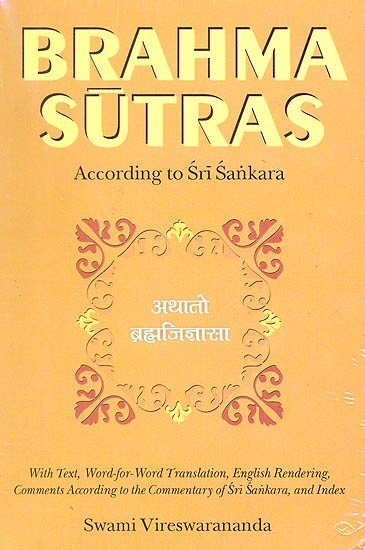Brahma Sutras (Shankara Bhashya)
by Swami Vireshwarananda | 1936 | 124,571 words | ISBN-10: 8175050063
This is the English translation of the Brahma-sutras including the commentary (Bhashya) of Shankara. The Brahma-sutra (or, Vedanta-sutra) is one of the three canonical texts of the Vedanta school of Hindu philosophy and represents an early exposition the Vedantic interpretation of the Upanishads. This edition has the original Sanskrit text, the r...
Chapter II, Section I, Adhikarana IX
Adhikarana summary: Brahman though without parts is yet the material cause of the world
Brahma-Sutra 2.1.26: Sanskrit text and English translation.
कृत्स्नप्रसक्तिर्निरवयवत्वशब्दकोपोवा ॥ २६ ॥
kṛtsnaprasaktirniravayavatvaśabdakopovā || 26 ||
kṛtsna-prasaktiḥ—Possibility of the entire (Brahman being modified); niravayavatvaśabda-kopaḥ—violation of the scriptural statement that Brahman is withouit parts; vā—or.
26. (Brahman’s being the cause of the world involves) either the possibility of the entire (Brahman being modified) or the violation of the scriptural statement that Brahman is without parts.
If Brahman is without parts and yet the material cause of the world, then we have to admit that the entire Brahman becomes changed into this multiform world. So there will be no Brahman left, but only the effect, the world. Moreover, it would contradict the scriptural text that Brahman is immutable. If on the other hand it is said that the whole of It does not undergo modification, but only a part, then we shall have to accept that Brahman is made up of parts, which is denied by scriptural texts. In either case it leads to a dilemma, and so Brahman cannot be the cause of the world.
Brahma-Sutra 2.1.27: Sanskrit text and English translation.
श्रुतेस्तु, शब्दमूलत्वात् ॥ २७ ॥
śrutestu, śabdamūlatvāt || 27 ||
śruteḥ—On account of scriptural texts; tu—but; śabdamūlatvāt—on account of being based on the scripture.
27. But (it cannot be like that) on account of scriptural texts (supporting both the apparently contradictory views) and on account of (Brahman) being based on the scripture only.
‘But’ refutes the view of the former Sutra.
The entire Brahman does not undergo change, though the scriptures say that the world originates from Brahman. Witness such texts as, “One foot (quarter) of Him is all beings, and three feet are what is immortal in heaven” (Chh. 3. 12. 6). And as in matters supersensuous the Srutis alone are authority, we have to accept that both these opposite views are true, though it does not stand to reason. The thing is, the change in Brahman is only apparent and not real. Hence both the views expressed by the Sruti are true. It is on this basis that the apparently contradictory texts become reconciled and not otherwise.
Brahma-Sutra 2.1.28: Sanskrit text and English translation.
आत्मनि चैवं विचित्राश्च हि ॥ २८ ॥
ātmani caivaṃ vicitrāśca hi || 28 ||
ātmani—In the individual soul; ca—and; evaṃ—thus; vicitrāḥ—diverse; ca—also; hi—because.
28. And because in the individual soul also (as in the case of magicians etc.) diverse (creation exists). Similarly (with Brahman).
This Sutra establishes the view of the former by citing an example.
In the dream state there appears in the individual self, which is one and indivisible, diversity resembling the waking state (See Brih. 4. 3. 10), and yet the indivisible character of the self is not marred by it. We see also magicians, for instance, producing a multiple creation without any change in themselves. Similarly this diverse creation springs from Brahman through Its inscrutable power of Maya, though Brahman Itself remains unchanged.
Brahma-Sutra 2.1.29: Sanskrit text and English translation.
स्वपक्षदोषाच्च ॥ २९ ॥
svapakṣadoṣācca || 29 ||
svapakṣa-doṣāt—On account of the opponent’s view being subject to these very objections; ca—and.
29. And on account of the opponent’s own view being subject to these very objections.
If the Pradhana is taken to be the First Cause, as the opponents of the Vedantic view (the Sankhyas) hold, in that case also, as the Pradhana too is without parts, the Sankhyan view will be equally subject to the objections raised against Brahman as the First Cause, The Vedanta viewpoint has, however, answered all these objections, while the Sankhyas and Vaiseshikas cannot answer them, the changes being real according to them.
